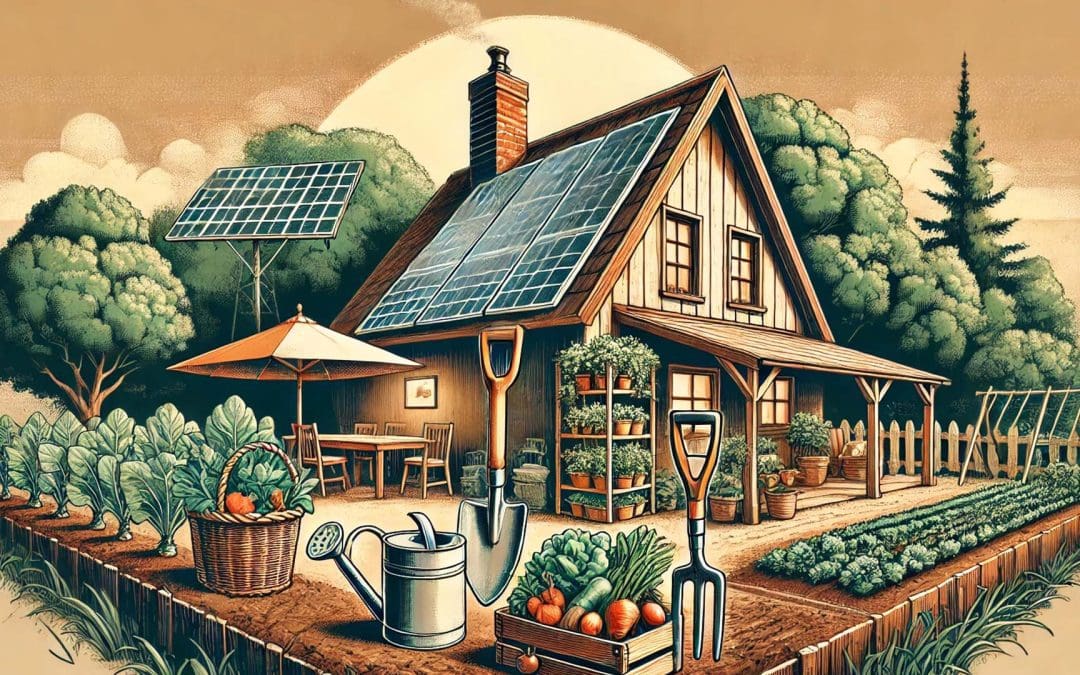Living off the grid is more than a lifestyle—it’s a commitment to self-sufficiency, sustainability, and independence. To thrive in this rewarding but challenging way of life, mastering certain skills is essential. Here’s a comprehensive guide to the 10 must-have skills for off-grid homesteading success.
1. Gardening and Food Production
Growing your own food is a cornerstone of off-grid homesteading. Developing a productive garden requires knowledge of:
- Soil Preparation: Understand soil types, pH levels, and how to amend soil with compost.
- Crop Selection: Choose crops suitable for your climate and growing season.
- Companion Planting: Use plant pairings to maximize yields and deter pests.
A thriving garden ensures a steady supply of fresh produce while reducing your reliance on store-bought food.
2. Preserving and Storing Food
To enjoy your harvest year-round, food preservation skills are essential:
- Canning: Learn water-bath and pressure canning for fruits, vegetables, and meats.
- Dehydrating: Remove moisture from food for long-term storage.
- Fermenting: Use techniques like pickling to enhance shelf life and flavor.
Mastering these methods ensures you have food even during the off-season or emergencies.
3. Building and Carpentry
Homesteading often involves constructing and maintaining structures. Key skills include:
- Building Shelters: Learn how to build cabins, sheds, or animal shelters.
- Repairs and Maintenance: Be able to fix fences, roofs, and other structures.
- Tool Use: Familiarize yourself with essential tools like saws, drills, and levels.
These skills save money and allow you to customize your homestead to meet your needs.
4. Water Management
Water is a critical resource for any off-grid homestead. Skills in water management include:
- Rainwater Harvesting: Set up gutters and storage tanks to collect and store rainwater.
- Filtration Systems: Use sand filters, UV purifiers, or charcoal filters to ensure clean water.
- Irrigation: Install gravity-fed or solar-powered systems for efficient garden watering.
Proper water management ensures a sustainable supply for drinking, gardening, and cleaning.
5. Renewable Energy Basics
Generating your own energy is essential for off-grid living. Learn the basics of:
- Solar Power: Install and maintain solar panels and batteries.
- Wind Turbines: Understand how wind power can complement solar energy.
- Energy Conservation: Reduce energy use with efficient appliances and habits.
Having renewable energy skills ensures you can power your home sustainably and cost-effectively.
6. Animal Husbandry
Caring for livestock provides a reliable source of food and other resources. Focus on:
- Raising Chickens: For eggs, meat, and natural pest control.
- Goats and Sheep: For milk, meat, and wool.
- Beekeeping: Harvest honey and beeswax while supporting pollination.
Understanding animal care improves your self-sufficiency and diversifies your food supply.
7. First Aid and Basic Medical Knowledge
Living off-grid often means being far from immediate medical care. Essential first-aid skills include:
- Wound Care: Clean and dress cuts to prevent infection.
- CPR: Be prepared for cardiac emergencies.
- Natural Remedies: Learn to use medicinal plants for minor ailments.
Having these skills ensures your health and safety while living independently.
8. Cooking from Scratch
Off-grid homesteaders often rely on homegrown or locally sourced ingredients. Skills to master:
- Baking Bread: Use simple ingredients and methods, even without an oven.
- Cooking Over Fire: Learn to use wood stoves or open flames effectively.
- Preserving Ingredients: Incorporate your preserved food into meals year-round.
Cooking from scratch not only saves money but also enhances your food’s quality and nutrition.
9. Foraging and Wildcrafting
Nature offers an abundance of resources if you know where to look. Learn to:
- Identify Edible Plants: Recognize safe, nutritious plants in your area.
- Harvest Wild Herbs: Use herbs for cooking or medicinal purposes.
- Wildcraft Materials: Gather natural resources like wood, vines, or stones for homestead use.
These skills reduce reliance on store-bought supplies and deepen your connection to the land.
10. Problem-Solving and Adaptability
Homesteading rarely goes as planned, so being resourceful and adaptable is critical. Develop these traits:
- DIY Repairs: Be ready to fix tools, plumbing, or electrical systems with what’s on hand.
- Creative Solutions: Think outside the box to solve unexpected challenges.
- Resilience: Learn to bounce back from setbacks with patience and determination.
With these problem-solving skills, you’ll be better prepared to handle the ups and downs of off-grid living.
Conclusion
Mastering these 10 essential skills for off-grid homesteading success will empower you to thrive independently. From growing food to managing energy and water, these abilities form the foundation of a sustainable, self-sufficient lifestyle.
Start practicing these skills today, and watch as your confidence in off-grid living grows. For more tips and in-depth guides, explore additional resources at Luke & Dakota Off Grid.

